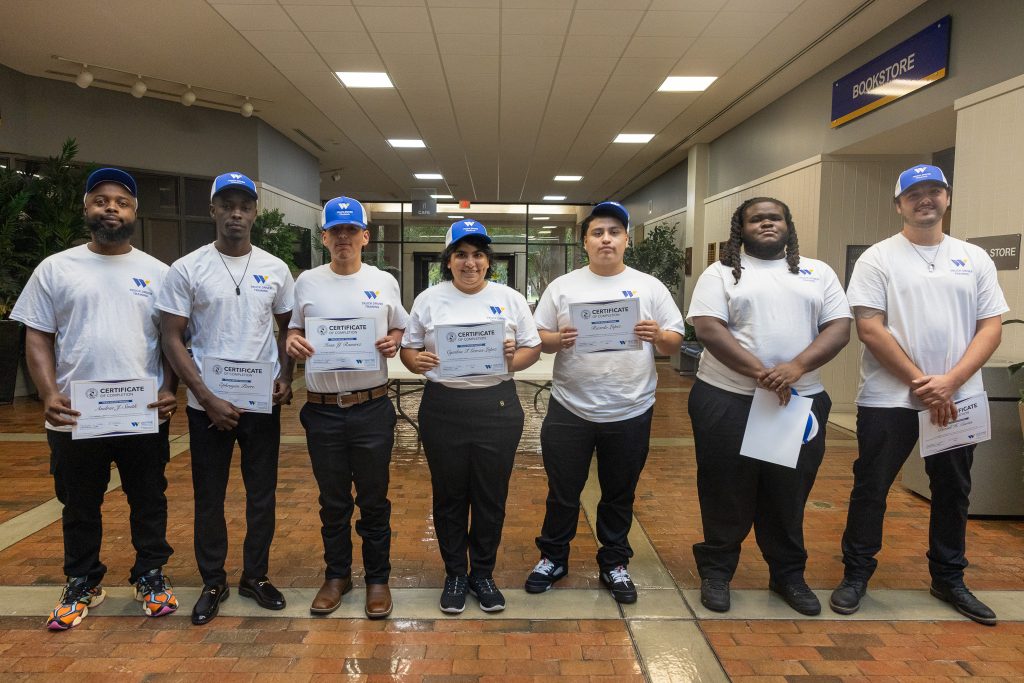Wayne Community College held a graduation ceremony for the 17th evening class of its Truck Driver Training program.
Graduates of the program were tested through written and behind-the-wheel exams to ensure they have the skills and knowledge required to safely and successfully operate commercial vehicles. These individuals earned a Class A Commercial Driver’s License, DOT 380 certificate, and WCC Workforce Continuing Education certificate.

WCC Vice President of Workforce Continuing Education Services and Community Engagement Renita Dawson commended the graduates for their determination to enter a high-demand career that is crucial to the economy. “You are not just graduating from a training program. You are stepping into a vital role that supports industries, communities, and families nationwide,” she said.
During the ceremony, graduates Daniel Curtis and Andrae Smith offered reflections on behalf of their class.
Curtis said his classmates’ shared experience helped them support one another throughout the program. “We shared laughs, struggles, and success,” he said. “Now we’re heading in different directions, but we’re all aiming for the same thing: a solid career, a safe journey, and a better future.”
Smith encouraged his fellow graduates to keep their goals in mind as they start their new journey. “If we keep thinking ahead, staying sharp, and carrying ourselves with the same grit that got us through this program, we’ll be more than safe drivers. We’ll become unstoppable,” he shared.
Christopher Cobb, lead instructor of the Truck Driver Training program, emphasized the importance of safety in the truck driving profession. “In the trucking industry, safety is more than just a requirement. It’s a promise—a promise to operate with care, to respect the responsibilities that come with such a powerful machine, and to honor the trust that the public places in us every day,” he said.
Cobb led the graduates in a traditional truck driving oath to commit to professionalism, responsibility, and above all, safety.
Curtis and Travis Horne received special recognition during the ceremony as the graduates with the highest grade point average in the class.
The seven graduates, listed by city of residence, are:
Albertson
Ivan Y. Ramirez
Dudley
Daniel H. Curtis
Goldsboro
Cynthia T. Garcia-Lopez
Travis K. Horne
Ricardo Lopez
Mount Olive
Ephrayim Pierre
Pikeville
Andrae J. Smith
Graduates of the Truck Driver Training program can expect to earn from $40,000 to $60,000 annually in their first year with an established company. Employment is available locally, regionally, and nationally in various industries, in governmental agencies, and by self-employment.
The program’s next course will run from Sept. 2–Dec. 18. Classes will be held from 6–10 p.m. Tuesdays through Thursdays and 7 a.m.–4 p.m. on Saturdays.
A list of enrollment requirements, as well as details about the program, can be found at https://www.waynecc.edu/truck.
For more information about the Truck Driver Training program, contact WCC Workforce and Community Service Programs Coordinator Lisa Newkirk at 919-739-6931 or ldnewkirk@waynecc.edu.
About Wayne Community College
Wayne Community College is a public, learning-centered institution with an open-door admission policy located in Goldsboro, N.C. As it works to develop a highly skilled and competitive workforce, the college serves around 10,000 individuals annually as well as businesses, industry, and community organizations with high quality, affordable, accessible learning opportunities, including more than 150 college credit programs. WCC’s mission is to meet the educational, training, and cultural needs of the communities it serves.
